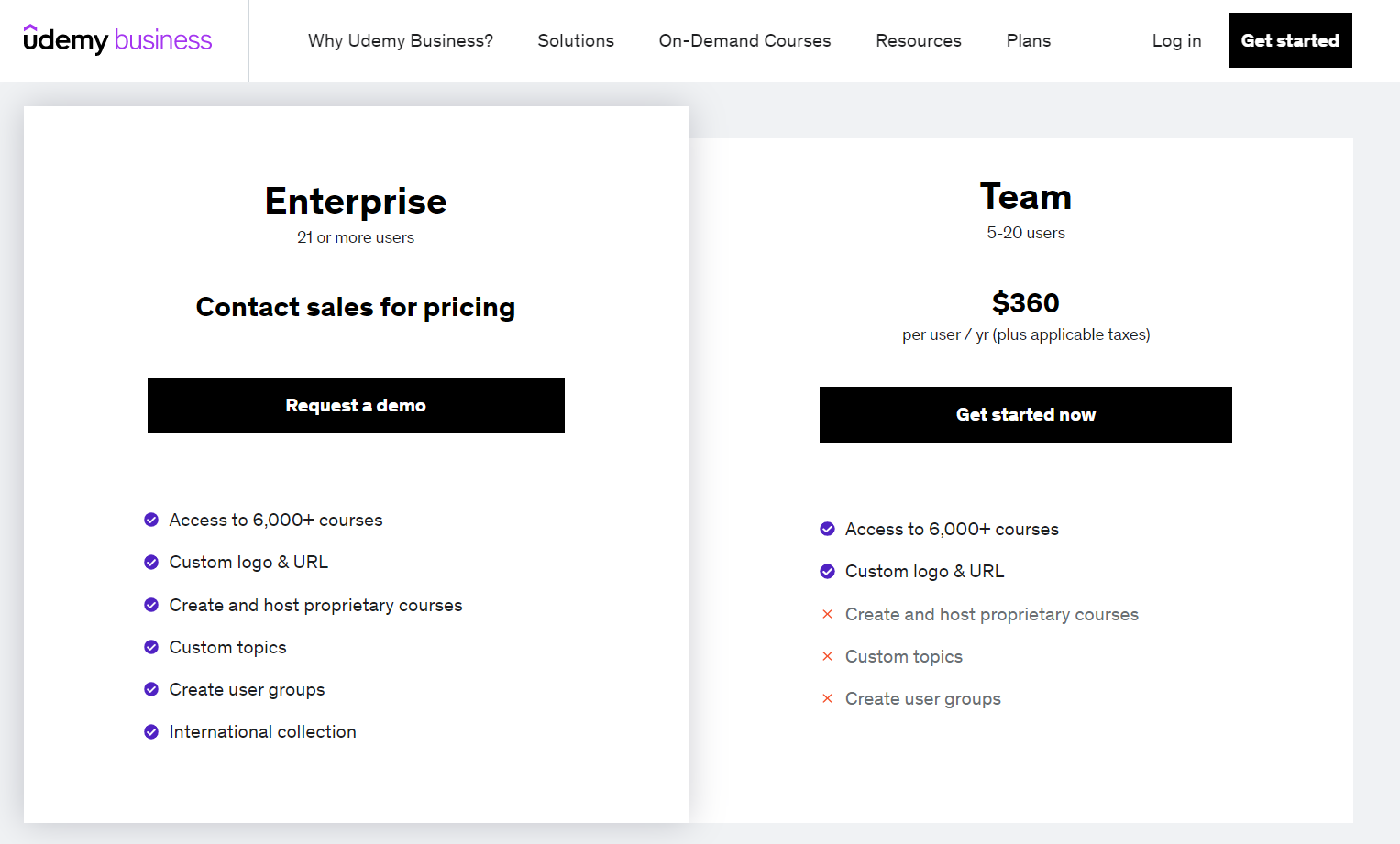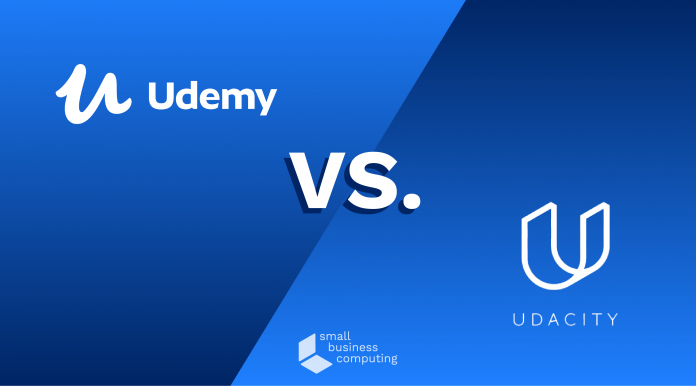Many organizations face the challenge of bridging the skill gap in their workforce. Corporate learning management systems (LMS) not only help businesses in upskilling their employees but also save a lot of time and money as compared to traditional instructor-led, classroom training. Two of such popular e-learning platforms are Udemy and Udacity.
Udemy is a massive online open course (MOOC) e-learning platform that allows solopreneurs and small organizations to host and sell their courses online, as well as train their employees. Designed for businesses of all sizes, Udemy for Business is an enterprise-grade platform that helps in the training and development of employees.
Udacity is also a MOOC and a powerful digital education platform that aims at helping companies upskill their workforce with in-demand career skills. It partners with top-tier industries, not academics, to develop a curriculum that teaches real employable skills to the employees. With its project-based, active, and self-paced learning, Udacity empowers your employees to master innovative tech skills.
The programs offered by Udacity are called Nanodegrees that are recognized by employers around the world. These programs come with services such as mentorship, career coaching, and resume/CV, cover letters, LinkedIn, and GitHub reviews. Udacity focuses on highly job-specific skills in data science, business, cloud computing, machine learning, artificial intelligence, programming, and more.
Let’s compare both LMS vendors based on their features.
Udemy offers all sorts of courses from development, business, marketing, professional development, and accounting to music, photography, lifestyle, health, and fitness. You can easily filter out the relevant one based on difficulty level, duration, ratings, price, and language. Each course shows a brief course preview, instructor’s introduction, course content, quizzes/assessments, and students’ reviews to help you choose the right one.
Udacity’s course catalog might not be as extensive as Udemy, but it offers more specialized programs and courses, focusing on the career growth of business professionals in tech-forward enterprises. You can sort the courses based on duration, industry type, paid or free courses, or a nanodegree program. These are some of the basic course types from Udacity:
As compared to Udemy’s self-paced courses, Udacity courses require a longer time commitment and a strict schedule to follow. Also, Udacity only allows expert-authored content approved by their administrators, as compared to Udemy where anyone can post their course.
Both platforms provide user-friendly interfaces and quick registration processes, but only Udemy offers a mobile app for Android and iOS for offline access to course content.
With Udemy, you can register with your name, email, and password and use the free trial version without inserting your card details. You can easily preview the courses, add the ones you like to the cart, and checkout after making payment. With an easy-to-use course interface and video player, you can adjust video speed and resolution, enable subtitles, and add notes to any part of the video.
Udacity also offers an intuitive interface and a simple registration process. It uses a YouTube video player, so you can adjust the video quality and subtitles. You can search for a particular concept within the course, download transcripts or other material, as well as send feedback or ask questions. Some reviewers complained that the Udacity customer support doesn’t respond well and sometimes it gets difficult to cancel the subscription.
Neither of the platforms is an accredited institution, so their certificates are not recognized by universities. If you’re looking to advance in your career with a certified course or specialized degree program, then Coursera or edX are the right platforms for you.
Read: Udemy vs Coursera LMS Comparison
Udemy offers a Certificate of Completion (COC) after the successful completion of a paid course. However, it doesn’t hold much value, academically or professionally, as the courses are of untested quality and lack a proper grading system.
Udacity courses are developed by industry experts in collaboration with tech giants such as Google, Amazon, Mercedez, Microsoft, and more. Also, nanodegree programs follow a structured approach, timely enrollment, proper syllabus, exercises, and grading system, and need more time commitment as compared to Udemy courses. Therefore even though unaccredited, Udacity completion certificates are recognized by many organizations and potential employers may consider these closer to traditional certifications.
Udacity also provides career coaching to help you advance in your career. It helps you get noticed with resume review, LinkedIn and GitHub review, access to Udacity Talent Program, and exclusive job postings by tech giants and other enterprises, and by strengthening your network to help you land your dream job.
Both Udacity and Udemy offer hundreds of free courses but only paid courses provide access to quizzes, assessments, discussions, and course completion certificates.
Udacity courses and nanodegree programs are more expensive than Udemy, where you can find some courses at as low as $10 and most of the courses are frequently discounted. The pricing per course or program varies in Udacity and you have to look at the program details to get this information.
To enroll in a Udacity nanodegree program, you need to pay $399 per month (or $339/month for the prepaid plan). Each program requires somewhere between 2-6 months to complete. You can finish a course at your own pace, but if you take a longer time to complete, you’ll have to pay a higher price.
The organizations looking for an enterprise plan for their teams will need to request a quote. These companies can fill out a form specifying their needs, and Udacity customer support will provide them with a customized team plan.
Udemy allows you to pay per course and get lifetime access to the material. Udemy for Business offers two subscription plans: Team and Enterprise.
While Udemy has a huge catalog of courses in dozens of languages, Udacity offers more structured, highly specific, and curated content.
Udemy is a more budget-friendly option for individuals or employees looking to pay per course and learn at their own pace. Some of the Udemy courses can be completed within a few hours while Udacity courses take months to complete.
The course and instructor quality at Udemy varies significantly, as anyone can become an instructor and sell their course. Udacity, on the other hand, only allows leading industry experts to develop a well-structured and specialized curriculum. It’s more focused on helping businesses streamline their workflows and equip their employees with innovative technical skills and career coaching.
Considering that Udacity is not an accredited institution, its degrees and programs are really expensive for individuals and small businesses. Unlike Udemy where you get lifetime access to the courses you’ve purchased, Udacity only allows subscription-based access for a few months.
Considering the number of great LMS options available in the market, choosing the right LMS for your business can be overwhelming. You can check our top LMS Products List to know which one is suitable for your business needs.
Also read:
Small Business Computing addresses the technology needs of small businesses. To address their needs, SBC offers detailed coverage of cost-effective technology solutions, including lists of top vendors, product comparisons, and how-to guides that offer specific tools to help solve issues.
Advertiser Disclosure: Some of the products that appear on this site are from companies from which TechnologyAdvice receives compensation. This compensation may impact how and where products appear on this site including, for example, the order in which they appear. TechnologyAdvice does not include all companies or all types of products available in the marketplace.






